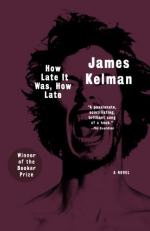|
This section contains 1,643 words (approx. 6 pages at 300 words per page) |

|
SOURCE: "In Holy Boozers," in The Times Literary Supplement, No. 4748, April 1, 1994, p. 20.
[Mars-Jones is an English critic, editor, and short story writer. In the mixed review below, he offers a thematic and stylistic discussion of How Late It Was, How Late, noting Kelman's political and linguistic focus.]
When Julius Caesar taught himself to read without reading aloud—to safeguard military secrets—it was regarded as a troubling innovation. The general had taken language inside his head and made it private. Since then the scars of separation have long healed, but there persists at the back of some minds a fantasy of reunion: writing returning to the womb of speech.
In James Kelman's fiction, this fantasy of a defiant wholeness has a political agenda superimposed on it, which seems compatible but actually clashes: that of giving a voice to the voiceless, those whom society and literature ignore. Even this...
|
This section contains 1,643 words (approx. 6 pages at 300 words per page) |

|


